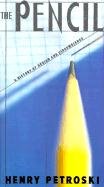Kayote B. (kayote) reviewed The Pencil : A History of Design and Circumstance on + 254 more book reviews
This book was a disappointment. I very much enjoyed the author's previous book (To Engineer is Human) and settled in with this one with great anticipation. Unfortunately, he only has a sketch of the pencil's history (because much of it is unknown), and he strains to tie it to engineering in general. The idea is good. I'm not sure the chosen item is the best choice, and the engineering side is incredibly repetitive, and reminds me of a high school paper trying to draw connections between two things. Even when the connections are solid, the same statements made over and over get old and start detracting from the solidness of the connection. The introduction was repeated over and over--I did not find the story of engineering flowing out of the story of pencils; I found it being thrust out repeatedly at me as inserted paragraphs. Also, it read like inserted introduction, rather than meat of engineering. This book would have been much better had it been effectively edited; it would have tied the two themes together more solidly, would have been probably half the length, and would not have wandered quite so much. While I realize that the history of the pencil is shrouded in mystery, the book is much too long for an item where much of its history is simply unknown and must be guessed or glossed over--that grew quite irritating as the book went on. If there's so little details, why did he choose the pencil to write about and try to graft engineering onto, rather than picking some object with a more traceable history?
The book was interesting, but it was tiring enough to read to detract from what was solid within it. I'm not sure there was enough to make slogging through it worthwhile either.
The book was interesting, but it was tiring enough to read to detract from what was solid within it. I'm not sure there was enough to make slogging through it worthwhile either.




![header=[] body=[Get a free book credit right now by joining the club and listing 5 books you have and are willing to share with other members!] Help icon](/images/question.gif?v=90afaeb39)
